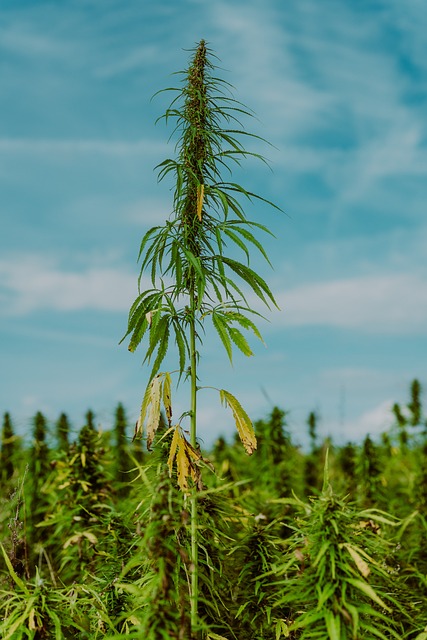THCA flower extract, a non-psychoactive compound derived from the cannabis plant’s raw buds, is gaining attention for its potential health benefits, including analgesic and anti-inflammatory effects that may alleviate conditions like arthritis and chronic pain. Its neuroprotective properties are also being studied for their implications in neurological health. The unique cannabinoid profile of THCA IndaCloud for hemp lovers flower extract is believed to offer stress reduction, immune system support, and other wellness benefits. As scientific research progresses, the diverse applications of THCA flower extract as a natural therapeutic option continue to emerge, with its acidic cannabinoids potentially offering more potent effects than their decarboxylated counterparts like delta-9-THC. Consumers have various ways to use THCA flower extract, such as vaporization or in edibles. It’s important for individuals to consult healthcare providers before use due to its interactions and effects on bodily functions. The cannabinoid market is expected to expand with more tailored THCA flower extract products becoming available, catering to a wider range of health concerns and preferences.
Discover the transformative potential of THCA flower extract, a natural precursor to THC, within the evolving landscape of cannabinoid wellness. This article delves into the in-depth science behind THCA, from its molecular makeup to the intricate extraction processes that capture its purity and potency. We explore the therapeutic properties of this cannabinoid, examining its anti-inflammatory, analgesic, neuroprotective, antioxidant, and immune-modulating effects. By reviewing preliminary research and clinical studies, user experiences, and safety considerations, we aim to shed light on the myriad benefits of THCA flower extract and its growing role in holistic health regimens. Join us as we uncover the true potential of this promising cannabinoid.
Unveiling the Potential of THCA Flower Extract: An Overview

THCA flower extract, derived from the unprocessed buds of the cannabis plant, has garnered attention for its potential wellness benefits. Unlike its psychoactive counterpart, delta-9-THC, THCA exists in its non-psychoactive acid form and is gaining popularity for its therapeutic properties. Research suggests that THCA Flower for Sleep may offer analgesic and anti-inflammatory effects, which could be beneficial for conditions like arthritis and chronic pain. Additionally, studies indicate that it might have neuroprotective qualities, making it a subject of interest in the realm of neurological health. The unique cannabinoid profile of THCA flower extract is thought to contribute to its potential health benefits, including stress relief and support for immune system function. As scientific exploration continues, the scope of THCA flower extract’s advantages becomes clearer, offering promising avenues for natural wellness.
The extraction process of THCA flower preserves the raw cannabinoids in their acidic form, which some consumers believe offers a more potent and broader range of effects compared to its neutral form, delta-9-THC. Consumers interested in exploring the benefits of THCA flower extract can do so through various consumption methods, such as vaporization or infusion into edibles. It’s important for potential users to consult with healthcare professionals before incorporating THCA flower extract into their wellness routine, especially considering its interactions with other medications and its potential effects on bodily systems. As the market for cannabis-derived products expands, the availability and diversity of THCA flower extract products are likely to increase, providing consumers with a wider array of choices to meet their specific needs.

THCA flower extract, which contains Tetrahydrocannabinolic Acid (THCA), is garnering attention for its potential health benefits. Unlike its well-known counterpart Delta-9-THC, THCA is non-psychoactive, making it a favorable option for those seeking the therapeutic effects of cannabis without the ‘high’. Extracts from raw cannabis flowers that are rich in THCA have been studied for their anti-inflammatory and neuroprotective properties. Research indicates that THCA may contribute to pain relief, particularly for neuropathic conditions, due to its interaction with the body’s endocannabinoid system. This system plays a crucial role in regulating various physiological processes, including mood, appetite, and pain sensation. Additionally, THCA is being explored for its potential to support overall health, with preliminary findings suggesting it could have anti-nausea properties, making it a subject of interest in oncology treatment support. The extract’s benefits extend to joint health as well, where it may offer relief from arthritic pain and inflammation, offering a promising alternative for individuals looking to manage these symptoms naturally. As research continues, the full scope of THCA flower extract’s advantages becomes increasingly apparent, highlighting its potential in various health and wellness applications.
THCA flower extract has emerged as a subject of considerable interest within the wellness community, offering a range of potential benefits. This article has provided an in-depth exploration of the properties and effects of THCA flower extract, shedding light on its unique position in the cannabinoid spectrum. As research continues to unfold, the significance of THCA as a precursor to THC becomes increasingly clear, highlighting its potential for wellness support. Users intrigued by the therapeutic properties of cannabinoids are encouraged to consider how THCA flower extract might fit into their health regimen. With ongoing scientific scrutiny, the benefits of this natural compound may yet be further realized, underscoring the importance of responsible exploration and innovation in this field.
